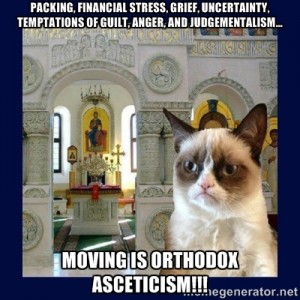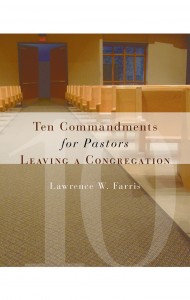On 13 September 2015, I served my last Divine Liturgy at St. Michael’s in Woonsocket, RI. Although in many ways the situation was ideal (it was an amicable parting; I wasn’t driven out by them or by frustration with them), it was still very difficult. I wanted to do it well, for their benefit, for my benefit, and for the benefit of the priest that followed me (and of course, so that God could be glorified the brightest). I was helped in this by the advice of my mentors and by a book on the subject; Ten Commandments for Pastors Leaving a Congregation, by Lawrence Farris (2006, Erdman’s). I had benefitted from Rev. Farris’ book Ten Commandments for Pastors New to a Congregation (2003, Erdman’s) eight years earlier when I started at St. Michael’s and this book was at least as helpful.
As Donald Rumsfeld put it back in the day; “There are known knowns. There are things we know that we know. There are known unknowns. That is to say there are things that we now know we don’t know. But there are also unknown unknowns. There are things we don’t know we don’t know.”
This book taught me to deal well with issues that weren’t even on my radar and to deal well with the things that were. In this post, I hope to share the crux of Rev. Farris’ wisdom (of course the best way to get it is to buy the book!).
+++
Priests know the funeral service (and the associated pastoral theology of death) inside and out. One of the truths the service conveys is how unnatural it is for us to be sundered from those we love. Love is one of the great names of God. He is Powerful, Eternal, and One; and love allows us to commune with Him in expectation of eternal union with all who share in this bond. We rail against death because it is an affront to this Truth and we celebrate the Resurrection because it signals the restoration of God’s purpose on earth and our eternal participation in the unity that is found in Him and His love. We understand this and we understand the need for death in a fallen world (“to give rest to the departed”)… but we also understand the need for grief.
Grief occurs anytime a cherished bond is broken, to include that between a priest and his parish. These practical “Ten Commandments” help pastors turn the dirge of leaving a parish into the hymn of “alleluia” for them in their new assignment, for the priest who takes his place, and the parishioners involved.
1. Thou Shalt Know When It Is Time To Go. I found this to be incredibly reassuring. I was being run ragged in my last few years at St. Michael’s; not only were we going through a long rebuilding effort, I was spending more time on the road at seminary. It wasn’t sustainable and my family and I were suffering. Once the parish was back into its building, moving became a reasonable option.
In addition to the completion of major projects, other propitious times for priests to consider leaving include retirement, being called to a new ministry, being the wrong person to mediate/end parish conflict (this is especially likely if he has sided with one side in the conflict), a sense of diminishing returns, and burn out.
The author makes an important point about discerning the time to move: it is an ecclesial, communal process involving family, spiritual mentors, the bishop, and lots of prayer. Being aware of the average length of previous tenures (the priest’s own and that of the parish) is useful in this discernment process.
2. Thou Shalt Explain Thyself. It isn’t fair or useful to “blame the bishop”, “neither will it suffice to attribute the decision utterly and entirely to the immutable call of God, as if one hand no say in the matter whatsoever.” It is the priest’s responsibility to explain the transition in such a way that glorifies God and witnesses to the right way of living and making decisions.
It is relatively easy to explain retirement, but what about when things are going well? In this case, the priest has to take the time to explain the timing and direction of the change. Doing it well will help parishioners deal with similar changes in their own lives.
Framing the situation well may be hardest when the priest and a significant proportion of the parish have been at cross-purposes. In this case, there has to be an honest and objective assessment of how the mismatch occurred. In this, the priest has to demonstrate the Christian virtues of patience and charity. He is (or should be!) much better equipped to avoid the terrible temptations of blame, despondency, and self-righteousness (and these are really effective tools of the evil one during this process) than the people he leads and serves.
Whether through sermons, letters, discussions, or farewell addresses, this commandment must be followed. One note: information must be handled carefully. Rumors give great temptation for gossip. As with funerals and engagements, there is a certain propriety, but priests should tell everyone and “make it official” as soon as possible.
3. Thou Shalt Not Steal Away. Whenever possible, we should give at least three months notice to the parish that we are leaving. This gives adequate time “for pastor and congregation to say goodbye with depth, honesty, and gratitude.” This will make life harder – it’s a lot easier to wait and avoid the hassle. But a quick and quiet exit “steals” an opportunity for real growth and Christian witness.
During this time, it is especially important that departing priests spend time with people who are in special and unsettled situations, such as those who are sick or dying, going through marital counseling, or being treated for mental illness. Again, this is difficult as there is no real resolution to the issue. Other parts of the “farewell tour” are easier, but priests owe it to the suffering to add as little to their burden as possible. Guilt is a real temptation in this and other aspects of the transition.
4. Thou Shalt Affirm Thy Congregation’s Ministry. Leaving is an ideal time to assess the parish’s strengths and accomplishments, and to encourage the parish in its work. The same is true for the priest. Homilies, board meetings, bulletins, letters, and home visitations are an opportunity to remind parishioners who they are, how far they have come, and what they are called to do in the future. This – and a good self-examination (ideally with the assistance of mentors and spiritual fathers) will allow the parish to hit the ground running as their next priest arrives.
5. Thou Shalt Try to Mend Fences. No matter how good the priest’s tenure was, some of his relationships will “have been marked by conflict and hard feelings.” There may be no reason to expect it to bring mutual forgiveness (or even a hint of repentance), but the departing priest should make spending time with difficult parishioners part of his farewell tour. Closure doesn’t just come from happy endings (although that does sometimes happen and should be hoped for), but from leaving it all on the field. I didn’t try hard enough to reconcile with a couple of tough cases and I still regret it.
A dangerous temptation throughout this process is to “get back” at such people (not just in person, but in homilies etc.) and our (fallen) minds will give us plenty of justifications for doing this… but DON’T WRESTLE WITH PIGS! Leaving is not an opportunity to spew vitriol and pay people back for all the wrongs they have done. Again, it is the priest’s responsibility to use their parting as another opportunity to witness The Way of Christ to the world. While this occasionally does mean overturning tables and the like, few (if any) of us have the discernment to do it right… although we have probably all seen priests who try.
6. Thou Shalt Help Thy Successor Have A Good Beginning. “Here are two questions for the departing pastor to ponder; What do you know now that you wish you had known when you started the pastorate you are now leaving? As an actor of gracious collegiality and Christian fellowship, why not share this information with your successor?” Sharing intelligence and lessons learned with the next priest will help minimize the loss of momentum transitions cause.
Many professional jobs have a book (electronic or hard copy) that shares the institutional knowledge of the position; priests need to create the equivalent for their successors. Because it includes things like lists of addresses and personal needs of shut-in’s, this should be handled carefully and confidentially. My predecessor at St. Michael’s, Fr. John Harvey, did a great job with this, giving me everything from a list of local suppliers, to a list of shut-in’s and their expectations, to worship schedules and descriptions of how he and predecessors conducted the various services. Even better, he spent several hours on the phone with me telling me about the history of the parish and it people, where they were (to include strengths, weaknesses, opportunities, and threats), and the direction he had been leading them. Priests should remember to include any economias or special situations in the parish, as well as its history of dealing with sensitive subjects.
Another of the tools that we have at our disposal to set our successor up for success is social media. We can use Facebook et al to introduce our successors to the parish and community in a way that will allow him to make a critical good first impression and demonstrate our love and mutual trust. But be careful that this does not backfire: not everyone is comfortable with social media and miscommunication and mistaken assumptions that “love and mutual trust” can quickly turn into bitterness and spite (remember: transitions are stressful for all the priests involved!). I am thankful that my predecessors (and successor) have been so generous and charitable with me.
 7. Thou Shalt Be Gentle With Thyself. In his book on starting at a new parish, Rev. Farris has a really good section on self-care (something priests are lousy at); this is that section for leaving. Leaving is a painful process and provides more than its fair share of temptations. The “to do” list of the leaving pastor is HUGE, full of almost-finished projects, setting up the next guy for success, and getting ready to move (!!!). If priests aren’t intentional about doing the things that keep them healthy (e.g. prayer rule, repentance, exercise, diet, and recreation), they won’t be in any shape to leave well, much less make a good beginning at their next assignments.
7. Thou Shalt Be Gentle With Thyself. In his book on starting at a new parish, Rev. Farris has a really good section on self-care (something priests are lousy at); this is that section for leaving. Leaving is a painful process and provides more than its fair share of temptations. The “to do” list of the leaving pastor is HUGE, full of almost-finished projects, setting up the next guy for success, and getting ready to move (!!!). If priests aren’t intentional about doing the things that keep them healthy (e.g. prayer rule, repentance, exercise, diet, and recreation), they won’t be in any shape to leave well, much less make a good beginning at their next assignments.
It’s hard to underestimate how stressful this process is. A worn-out priest is sure to eventually give in to one temptation, and all it takes is one outburst or sarcastic comment to sour the transition (and even the entire pastoral term in some eyes).
Another good piece of advice is that priests also have to be willing to forgive themselves; “not all [these tasks] are going to get done, or they won’t get done as well as we would like. In spite of our best efforts, there will be loose ends that our successor will just have to deal with… [This] is to say that we can only do the best we can, and then submit that best effort to the congregation and to God as our farewell offering.”
8. Thou Shalt Attend To Thy Family. Moving and leaving the parish is at least as stressful to the priest’s family (and especially his wife) as it is for him. This isn’t a problem that can be solved (except over time, if the time is well spent), but it can be made easier if he listens to and communicates with his family and takes plenty of time off to be with them and deal with family issues (Presvetera has enough on her shoulders!).
Rev. Farris writes about taking unused vacation at this time. This is great advice if such things are workable. The logistics of our transition were pretty difficult and the time we have between assignments made it easier for us to show up at our new parish, if not refreshed, then at least less frazzled than we would have been.
While this is a controversial idea to some, priests were given a family to care for before they were given a parish; it’s all too easy for us to neglect this prior calling and wear out our spouses, alienate our children, and harm our marriages.
9. Thou Shalt (Usually) Stay Away Once Thou Hast Left. This is a tough one. Even in difficult assignments, priests invest a lot of themselves in the life of the parish and in the lives of parishioners. It can be really hard for them to let go. This is especially the case when “cherished ministries… begin to be compromised… well-established traditions are disregarded…, or if pastoral needs go unmet”; a problem magnified by the ease with which former parishioners can contact their erstwhile pastor to share their own discontent. Need I say that pride comes into play? The temptation to commiserate – or even to sympathetically listen to – the complaints (or even objective reports) has to be resisted.
No priest likes to be second-guessed or have someone – and especially his predecessor – dividing his parish or stabbing him in the back. Even if things are going poorly for the parish under the new priest, the former priest is almost always the wrong person to fix it. Of course priests should make themselves available to their replacements, but even then clear boundaries must be set. A single phone call to check-in should be enough.
Another strong piece of advice is to gently but categorically refuse to come back to serve baptisms, weddings, and/or funerals – at least for a few years (and it can’t be stressed enough that should this advice be ignored, PROPER PROTOCOL MUST BE FOLLOWED).
 10. Thou Shalt Grieve. This is another part of the transition that resembles a funeral: priests need to grieve, especially once they leave. Because there is so much to do in new assignments, this part of our “self-care” is easy to ignore, but as with the death of loved ones (and divorce), if priests ignore or try to shortchange the grieving process – it will eventually show up in unhealthy ways.
10. Thou Shalt Grieve. This is another part of the transition that resembles a funeral: priests need to grieve, especially once they leave. Because there is so much to do in new assignments, this part of our “self-care” is easy to ignore, but as with the death of loved ones (and divorce), if priests ignore or try to shortchange the grieving process – it will eventually show up in unhealthy ways.
I found it incredibly hard to live without all people I came to know and love in Rhode Island. Such separations are not something I expect (thorough God’s mercy and grace) to experience in the Kingdom, but (like death) it is necessary on this side of the eschaton.
Priests must “take the necessary time to feel and respond to all that wells up within so that [they] can begin the task of creating new and rich memories in a new setting. ‘Blessed are those who mourn, for they shall be comforted,’ said Jesus (Matthew 5:4). And, as always, he know whereof he spoke. No mourning, no comfort. And no freedom to give ourselves wholly to the new.”
11. (Thou Shalt Let Go and Trust). Priests cannot make a good beginning in their new assignments if they have not let go of the old one, and this is true regardless of whether that old assignment was good and healthy or bad and poisonous. Despite the vernacular (e.g. “my parish” and the use of “Father”), no parish belongs to any priest (other than The High Priest).
It is difficult for priests to “trust the system” and know that God’s will will be accomplished without their active participation in the lives of their former parishes … “but trust we must.”
Conclusion
“The best we can do when it comes to leaving a congregation is to bring the past to as complete and whole a conclusion as possible, so that all may rejoice in what has been good, learn from what has not, and move freely and faithfully forward into a promising future where God may be praised and served.”
I recognize that these ten (eleven!) commandments do not cover everything that the Orthodox priest in America deals with. For instance, many priests I have talked with have been frustrated with the way moves are managed (e.g. last-minute notice, unclear reasons and guidance, poor communication, little consideration taken for the practical needs of families, mortgages, etc.) and there is no doubt that, in such situations, the need for intentionality on the part of the priests is even more important! There are also Sacramental concerns that would probably get their own “commandments” for Orthodox hand-offs. For instance, how much should we share about the needs of our spiritual children (and how much CAN we share, given our absolute commitment to Confessional confidentiality)?
Those of you who have made such transitions, do these ten (eleven!) commandments ring true? What else should priests know? What sorts of things should they avoid or do? What have your found especially helpful or harmful during your own transitions?
In Christ,
Fr. Anthony Perkins


